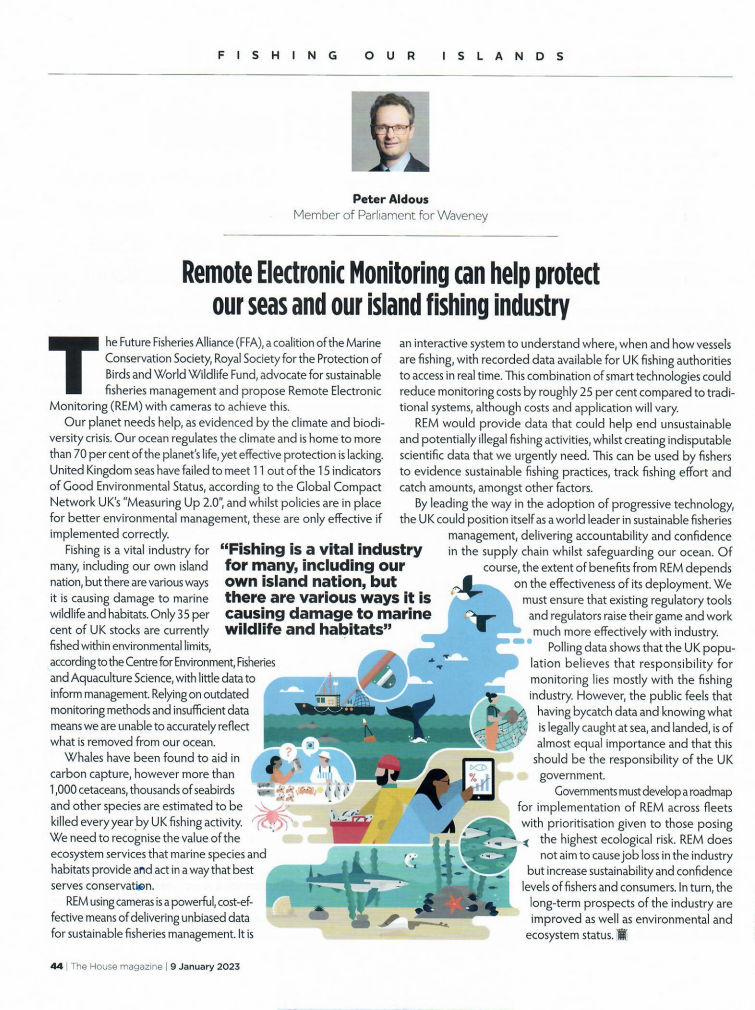We need to recognise the value of the ecosystem services that marine species and habitats provide and act in a way that best serves conservation.
Peter Aldous writes for The House Magazine.
The Future Fisheries Alliance (FFA), a coalition of the Marine Conservation Society, Royal Society for the Protection of Birds and World Wildlife Fund, advocate for sustainable fisheries management and propose Remote Electronic Monitoring (REM) with cameras to achieve this.
Our planet needs help, as evidenced by the climate and biodiversity crisis. Our ocean regulates the climate and is home to more than 70 per cent of the planet’s life, yet effective protection is lacking. United Kingdom seas have failed to meet 11 out of the 15 indicators of Good Environmental Status, according to the Global Compact Network UK’s “Measuring Up 2.0”, and whilst policies are in place for better environmental management, these are only effective if implemented correctly.
Fishing is a vital industry for many, including our own island nation, but there are various ways it is causing damage to marine wildlife and habitats. Only 35 per cent of UK stocks are currently fished within environmental limits, according to the Centre for Environment, Fisheries and Aquaculture Science, with little data to inform management. Relying on outdated monitoring methods and insufficient data means we are unable to accurately reflect what is removed from our ocean.
Whales have been found to aid in carbon capture, however more than 1,000 cetaceans, thousands of seabirds and other species are estimated to be killed every year by UK fishing activity. We need to recognise the value of the ecosystem services that marine species and habitats provide and act in a way that best serves conservation.
REM using cameras is a powerful, cost-effective means of delivering unbiased data for sustainable fisheries management. It is an interactive system to understand where, when and how vessels are fishing, with recorded data available for UK fishing authorities to access in real time. This combination of smart technologies could reduce monitoring costs by roughly 25 per cent compared to traditional systems, although costs and application will vary.
REM would provide data that could help end unsustainable and potentially illegal fishing activities, whilst creating indisputable scientific data that we urgently need. This can be used by fishers to evidence sustainable fishing practices, track fishing effort and catch amounts, amongst other factors.
By leading the way in the adoption of progressive technology, the UK could position itself as a world leader in sustainable fisheries management, delivering accountability and confidence in the supply chain whilst safeguarding our ocean. Of course, the extent of benefits from REM depends on the effectiveness of its deployment. We must ensure that existing regulatory tools and regulators raise their game and work much more effectively with industry.
Polling data shows that the UK population believes that responsibility for monitoring lies mostly with the fishing industry. However, the public feels that having bycatch data and knowing what is legally caught at sea, and landed, is of almost equal importance and that this should be the responsibility of the UK government.
Governments must develop a roadmap for implementation of REM across fleets with prioritisation given to those posing the highest ecological risk. REM does not aim to cause job loss in the industry but increase sustainability and confidence levels of fishers and consumers. In turn, the long-term prospects of the industry are improved as well as environmental and ecosystem status.

